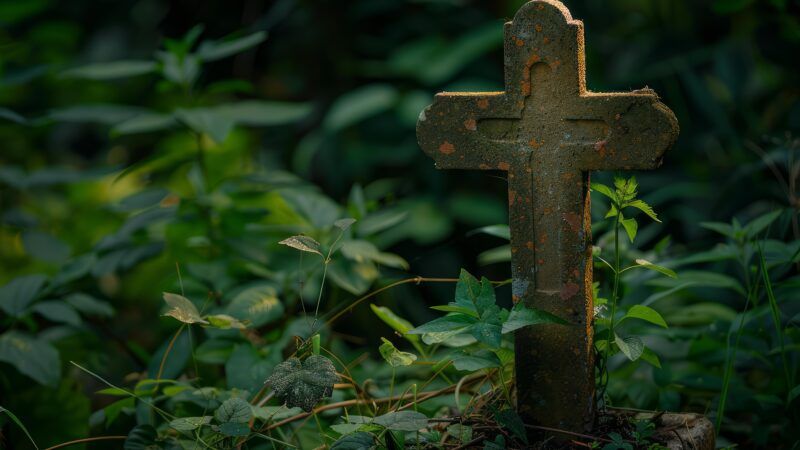Michigan Officials Tried To Stop a 'Green' Cemetery. They Just Lost in Court.
After a Michigan couple indicated their intent to open a green cemetery, their local township passed an ordinance to forbid it. A judge found the rule unconstitutional.

A Michigan couple sued when their local township passed an ordinance to prevent them from opening a cemetery. This week, in a victory for property rights, a judge ruled in the couple's favor and threw out the ordinance entirely.
As Reason reported in January, Peter and Annica Quakenbush wanted to open a "green" cemetery, allowing people to bury their loved ones in a natural and environmentally friendly manner, free of chemicals like formaldehyde and coffins containing metal. They specifically intended to establish a conservation burial ground, in which decedents would be buried in biodegradable coverings like cotton shrouds or wooden caskets and the burial sites would be marked by natural landmarks like rocks or native trees. The site would otherwise remain an undisturbed forest.
The Quakenbushes bought a 20-acre plot near Brooks Township and started putting together the necessary paperwork. But local officials had other plans in mind, and in June 2023, the Brooks Township Board passed an ordinance prohibiting the establishment of all new cemeteries.
"In the past, cemeteries elsewhere have taken up large amounts of sometimes otherwise productive land," the ordinance declared. "Cemetery landscaping, grass cutting, monument repair and upkeep costs have increased dramatically over time. The problems associated with abandoned or 'orphan' cemeteries have increased throughout Michigan, and citizens look to the local municipal government…to take over abandoned or orphan cemeteries."
According to the Quakenbushes' lawsuit, after they first inquired about establishing their cemetery in February 2022, a zoning official emailed the township's legal counsel. "It is our general recommendation that new private cemeteries not be allowed within the Township except under certain very limited circumstances," the attorney replied. "Almost certainly, at some time in the future (whether in a few decades or the distance [sic] future), the family members of the deceased individuals will no longer own the parcel involved. What happens to the burials then? In all likelihood, it would devalue the property and make it unmarketable or difficult to sell."
"My response to that is, what does it matter? It's not your property," Renée Flaherty, an attorney with the Institute for Justice who represented the Quakenbushes, told Reason in January.
Besides, there were numerous mechanisms in place to prevent that outcome: Establishing a conservation burial ground in accordance with the Green Burial Council's criteria, as is the Quakenbushes' intent, requires obtaining a conservation easement—preventing the land from being used for other purposes—and partnering with a land conservancy that can maintain the property in perpetuity.
Michigan state law also requires all private cemeteries to establish an "endowment and perpetual care trust fund," with $50,000 to start and monthly deposits of "not less than 15% of all proceeds received."
"Nearly 250 people had reserved a burial plot even while the ban was in place," a local FOX affiliate reported.
The Quakenbushes sued to overturn the ordinance as a violation of due process. The township filed a motion to dismiss the lawsuit. This week, after hearing oral arguments, Newaygo County Circuit Court Judge David Glancy not only dismissed the township's motion but found the ordinance unconstitutional.
A written order was not available at press time; a representative of the Newaygo County Circuit Court tells Reason that the court directed the plaintiffs' attorneys to prepare a ruling, which the judge will review in a later hearing.
"We're excited and feel vindicated by this ruling," the Quakenbushes said in a statement released by the Institute for Justice. "We are delighted that the judge understood that Brooks Township's ordinance violated our right to use our property and operate our cemetery."
"The Green Burial Council (GBC) is pleased to learn that Newaygo County, Michigan Circuit Judge David Glancy rejected Brooks Township's attempt to throw out a lawsuit against the 'cemetery ban' ordinance," the GBC said in a statement to Reason. "The Green Burial Council has stated before, that we believe Brooks Township's ordinance stood on a weak foundation of misinformation about green burial's negative impact on soil and water, and other similar fears. Though individuals may experience genuine trepidation about a naturally interred body's impact on their environment, local governments can easily find scientific evidence proving no such impact when burial practices are performed according to industry standards."*
UPDATE: This piece has been updated to include a statement from the Green Burial Council.


Show Comments (37)